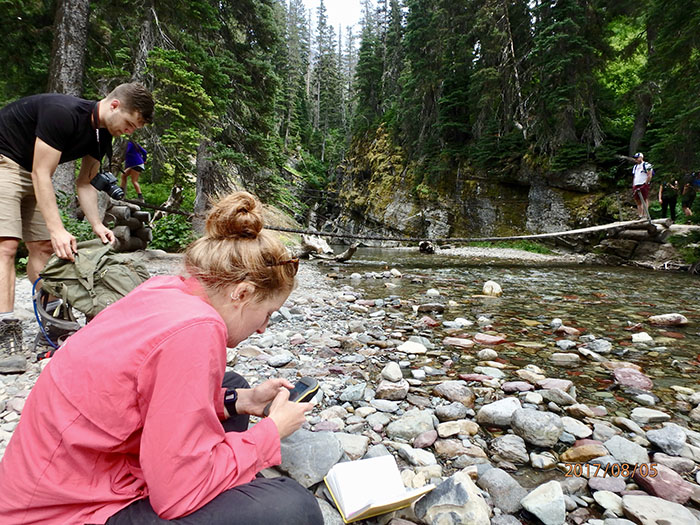What can I do with a major in Earth, Atmospheric and Planetary Sciences?
Careers IN Earth, Atmospheric & Planetary Sciences
Environment
Atmospheric Scientists, including meteorologists study weather, climate and other aspects of the atmosphere. They develop reports and forecasts from their analysis of weather aimnd climate data.
Climate Change Analysts (climatologists) evaluate scientific data and research about the climate. The climate data often includes, but is not limited to, information about atmospheric temperature, ocean conditions, ice masses and greenhouse gases.
Ecotourism Specialists seek to provide people with ways of seeing the world while doing minimal harm to the environment and respecting the cultures in the lands they visit.
Environmental Scientists & Specialists use their knowledge of the natural scientists to protect the environment.
Geoscientists perform laboratory and field tests to monitor the environment and investigate sources of pollution, including those that affect health.
Hydrologists examine the physical characteristics, distribution & circulation of water above & below the earth’s surface. They study rainfall & other precipitation, the paths precipitation takes through the soil & rocks underground, & its return to the oceans and air.
Renewable & Alternative Energy Specialists help ensure that we can meet the world’s energy needs in the future.
Education
Earth & Space Science Teachers educate students on the four basic areas of scientific study classified as part of earth science: oceanography, astronomy, meteorology and geology.
Museum Curators oversee museum collections by managing the acquisition, preservation and display of museum artifacts. They may conduct instructional, research, or public service activities of institution.
Museum Technicians (registrars) help curators by preparing and taking care of museum items. Registrars also may answer questions from the public and help curators and outside scholars use the collections.
Park Rangers teach people to respect the delicate natural balance of our national and state parks and forests.
Law and Government
Environmental Consultants are earth scientists who assist in the creation, analysis and enforcement of government policies designed to protect the environment from industrial hazards.
Environmental Lobbyists work to persuade politicians to vote on legislation in a way that will favor the interests of the environmental group they represent.
Science Policymakers serve as the bridge between researchers and the public, using their talents to find ways to translate esoteric, often highly technical scientific issues into something that can be sold as good policy.
Research and Development
Astronauts train to pilot a spacecraft, travel in a spacecraft or work in space.
Careers that USE Earth, Atmospheric, and Planetary Sciences

At Glacier National Park, Jordyn Miller and Noah calibrate the meters and ready themselves for a long hike.
Education
Science Writers describe discoveries and commercial developments in all branches of science, engineering, medicine and environmental science. They explain the impact these discoveries have on the lives of average individuals.
Environment
Air Quality Specialists’ work includes a variety of tasks having to do with air quality monitoring, air pollution inspections, regulation, law enforcement, and planning.
Cartographers design, prepare and revise maps, charts, plans, three-dimensional models and spatial information databases, often using computer-based techniques and applying principals from science, mathematics and graphic design.
Environmental Geologists study the interaction between the geosphere, hydrosphere, atmosphere, biosphere and human activities. They work to solve problems associated with pollution, waste management urbanization and natural selection.
Remote Sensing Scientists use sensors to analyze data and solve regional, national, and global problems in areas such as natural resource management, urban planning and climate and weather prediction.
Sanitarians perform laboratory and field tests to monitor the environment and investigate sources of pollution, including those that affect health.
Soil Scientists map and classify soils and provide interpretations for land planners and managers.
Soil & Water Conservationists work to discover, develop, implement, and constantly improve ways to use land that sustains its productive capacity, and enhances the environment at the same time.
Urban or Regional Planners develop plans and programs for the use of land.
Water Quality Specialists study how water quality affects human health, while considering the long-term “health” of pipes in the distribution system.
Research and Development
Aerospace engineers design, develop, and test aircraft, spacecraft, and missiles, as well as supervise the manufacture of these products.
Mining Geologists work in all aspects of the mining industry, from exploration, to mine design, to evaluating ore quality and to assisting in minimizing the impact of mining on the local environment.
Petroleum Geologists are involved in exploration for and production of oil and natural gas resources.
- Career Development
- What Can I do with a Major In...
- Career Mapping System
- Personalize Your Career Plan
- Build a Professional Profile
- Internships and Research
- Job Search Resources
- Programs & Events
- Additional Career Resources
- Archived Newsletters
- Applying to Graduate School
- Reporting Your Post-Grad Plans
- Post-Graduation Data
- Alumni Profiles